Installing Lazarus/Free Pascal on Debian based systems.
Concerning this document, please note the following:
- It is not a detailed tutorial on how to install Lazarus/Free Pascal on Debian or similar Linux platforms. It's rather intended to show some common problems, that you might encounter, if you install Lazarus on these systems, and, of course, show how to resolve them.
- Independently of what I write here, it should be possible to install Lazarus on all Debian systems, using AptGet, as described in my detailed installation tutorial Installing Lazarus/Free Pascal on Ubuntu. However, depending on the operating system used, you may have to face the issues discussed in this text.
- With the different OS, I used several different ways to install Lazarus. The choice was mostly done arbitrarily; mostly, it's possible, sometimes perhaps even better, to do the installation by another way. Note, however, that the success or the issues and their resolution, as described, may not apply to all installation methods, or be specific for the one that I chose.
- The success and issues reported may depend on the operating system version considered. Thus, what you'll experience, if you use another version than the one used by myself when writing the tutorial, may be different from what you expect after having read this text.
Operating systems overview.
The following table gives an overview of the operating systems, that I tested, with their version, the installation method, that I used, the version of Lazarus that was installed1 and an indication, where to look for further details. In the following paragraphs, I will give details concerning the different operating systems and discuss the problems that I encountered.
| Operating system | Version | Platform | Install method | Lazarus | Notes |
|---|---|---|---|---|---|
| antiX | 22 | 64-bit | AptGet | 2.0.10 | Cf. Ubuntu tutorial and antiX paragraph below |
| BioLinux | 8 | 64-bit | AptGet | 1.0.10 | Cf. Ubuntu tutorial |
| Bodhi Linux | 5.1 | 32-bit | Synaptic Package Manager | 1.8.2 | Cf. Bodhi Linux paragraph below |
| Bunsenlabs Linux | Boron | 32-bit | Apt | ? | Failure! Cf. Bunsenlabs Linux paragraph below |
| Debian | 11.4 | 64-bit | AptGet | 2.0.10 | Cf. Ubuntu tutorial and Debian paragraph below |
| Deepin Desktop | 20.5 | 64-bit | Deepin AppStore | 2.0.0 | No installation issues. Cf. Deepin paragraph below |
| elementary OS | 6.1 | 64-bit | AptGet | 2.0.6 | No installation issues. Cf. Ubuntu tutorial |
| Emmabuntüs | DE5 | 32-bit | Synaptic Package Manager | 2.2.2 | Cf. Emmabuntüs paragraph below |
| Kali Linux | 2021 4a | 64-bit | AptGet | 2.2.0 | Cf. Ubuntu tutorial and Kali Linux paragraph below |
| Kubuntu | 23.04 | 64-bit | AptGet | 2.2.4 | Cf. Ubuntu tutorial and Kubuntu paragraph below |
| Linuxfx | 11.1 | 64-bit | AptGet | 2.0.6 | No installation issues. Cf. Ubuntu tutorial |
| Linux Lite | 6.0 | 64-bit | Apt from ok2cqr/lazarus repository | 2.2.0 | Cf. Linux Lite paragraph below |
| MakuluLinux | LinDoz 2021 | 64-bit | Various | 2.2.0/2.0.10 | Failure! Cf. MakuluLinux paragraph below |
| Linux Mint | 20.3 | 64-bit | Not installed2 | 2.0.6 | I suppose that you can proceed as described in my Ubuntu tutorial |
| MX Linux | 21.1 | 64-bit | AptGet + MX Package Installer | 2.0.10 | Incomplete install with AptGet! Cf. MX Linux paragraph below |
| openKylin | 1.0 | 64-bit | Various | 3.0.0 | Failure! Cf. openKylin paragraph below |
| Parrot OS Security | 5.0.1 | 64-bit | Various | 2.2.0/2.0.10 | Failure! Cf. Parrot OS paragraph below |
| Peppermint OS (Devuan) | 11 | 32-bit | Synaptic Package Manager | 2.2.4/2.0.10 | Cf. Peppermint OS paragraph below |
| Pop!_OS | 22.04 | 64-bit | AptGet | 2.2.0 | Cf. Ubuntu tutorial and Pop!_OS paragraph below |
| SemiCode OS | 1.0 | 32-bit | AptGet | 1.0.10 | Cf. Ubuntu tutorial and SemiCode OS paragraph below |
| SysLinuxOS | 12.4 | 64-bit | AptGet | 2.2.6 | Cf. Ubuntu tutorial and SysLinuxOS paragraph below |
| Ubuntu | 18.04 | 64-bit | AptGet | 1.8 | Cf. detailed Ubuntu 18.04 tutorial |
| 20.04 | 64-bit | AptGet | 2.0.6 | Cf. Ubuntu tutorial | |
| Uruk GNU/Linux | 3.0 | 64-bit | Synaptic Package Manager | 2.0.10 | Cf. Uruk GNU/Linux paragraph below |
| wattOS | R13 | 64-bit | Synaptic Package Manager | 2.2.6 | Cf. wattOS paragraph below |
| Zorin OS | 16.1 | 64-bit | Apt from ok2cqr/lazarus repository | 2.0.6 | No installation issues. Cf. Zorin OS paragraph below |
Lazarus/FPC on antiX.
When you launch Lazarus for the first time, as on all other platforms, it's the Configure Lazarus IDE window that shows up. In the case of my Lazarus installation on antiX, problems were reported concerning the IDE itself, the Free Pascal sources and the GNU debugger.
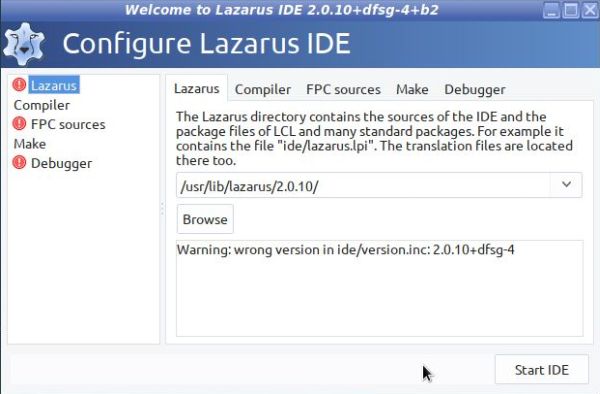 |
Concerning the sources, the error message tells us that the directory rtl has not been found. If you have a look into the directory
that should contain the sources, you'll see that there is nothing but the compiler messages. The FPC sources have obviously not be installed with the
apt-get install lazarus command! I decided to install all fpc packages, what can be done by the command:
apt-get install fpc
Similarly, the GDB related error occurs because the GNU debugger has not been installed. We can do it now by running the command:
apt-get install gdb
Note: If after these installs you restart Lazarus, you get the message shown on the screenshot: There is already a configuration from version 2.0.10 in /home/{user-name}/.lazarus. This is due to the fact, that a configuration file had been created when Lazarus was launched for the first time (after the apt-get install lazarus. You are asked if you want to change the configuration; push the Downgrade button to convert settings to the new configuration.
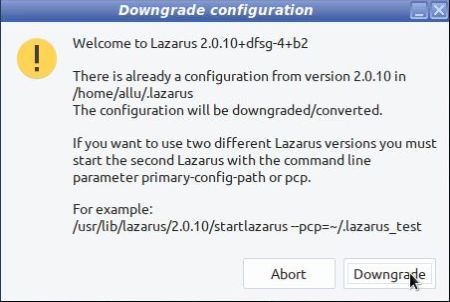 |
Concerning the IDE, the error is due to the fact that there is a wrong version in ide/version.inc: 2.0.10+dsfg-4, with the actual version
being 2.0.10+dsfg-4+b2, as you can see in the window's title bar on the screenshot above.
This issue may easily be resolved by correcting the version in the file ide/version.inc. You can use File
Explorer to browse to /usr/lib/lazarus/2.0.10/ide and open the file in Geany (the programming editor being used as default text editor on antiX). Change the version
stated in the file, adding the missing "+b2" and, as you cannot save the file directly as simple user, save it somewhere in your home directory, for example, the
Documents folder. Then open a terminal and enter the following in order copy the modified file as root to its original location:
su
cd Documents
cp version.inc /usr/lib/lazarus/2.0.10/ide
The next time, you start Lazarus, all should be ok.
Lazarus/FPC on Bodhi Linux.
In Synaptic package manager search for "lazarus", and in the list displayed, select "lazarus-1.8", "fpc-source", and "lazarus-doc". The installation succeeds without any problems.
To try it out, I build one of my electronics desktop applications. The build succeeded, and the application properly started up. However, with the dark mode display settings used by Lazarus on Bodhi Linux, the content of memos and static-texts is completely unreadable. Another example, that "write once – build everywhere" is a theory, that in the practice often doesn't work. Maybe that there is a possibility to disable dark mode, and doing so would give a proper display. I did not take the time to try...
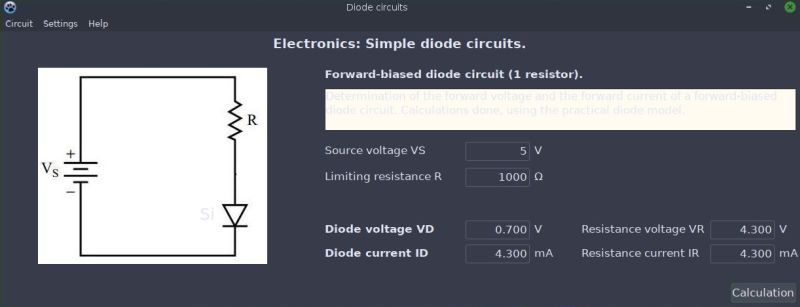 |
Lazarus/FPC on Bunsenlabs Linux.
I tried to install Lazarus on my 32-bit Bunsenlabs Linux Boron using Apt. The commands
apt search lazarus
apt show lazarus
apt search fpc
apt show fpc
all displayed the message Unable to locate package.
Maybe, adding the standard Debian repository would have solved the problem (?). I didn't try it out...
Lazarus/FPC on Debian.
When you launch Lazarus for the first time, as on all other platforms, it's the Configure Lazarus IDE window that shows up. In the case of my Lazarus installation on Debian, a problem was reported concerning the IDE itself: Wrong version in ide/version.inc: 2.0.10+dsfg-4, with the actual version being 2.0.10+dsfg-4+b2, as you can see in the window's title bar on the screenshot.
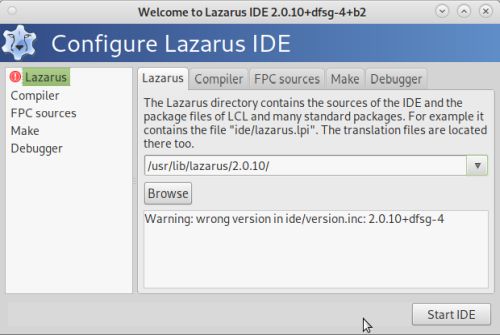 |
This issue may easily be resolved by correcting the version in the file ide/version.inc. You can use File
Explorer to browse to /usr/lib/lazarus/2.0.10/ide and open the file in Pluma (Debian default text editor). Change the version stated in the file, adding the missing
"+b2" and, as you cannot save the file directly as simple user, save it somewhere in your home directory, for example, the Documents folder. Then open a terminal and
enter the following in order copy the modified file as root to its original location:
su
cd Documents
cp version.inc /usr/lib/lazarus/2.0.10/ide/version.inc
The next time, you start Lazarus, all should be ok.
Lazarus/FPC on Deepin.
The installation of Lazarus/FPC on Deepin is a one-click operation. In fact, Lazarus is available in Deepin AppStore. Open this application and search for "lazarus". Select the only search result "Lazarus: The paradise for Pascal developers" and push the Install button. That's it! And no problem encountered on my system.
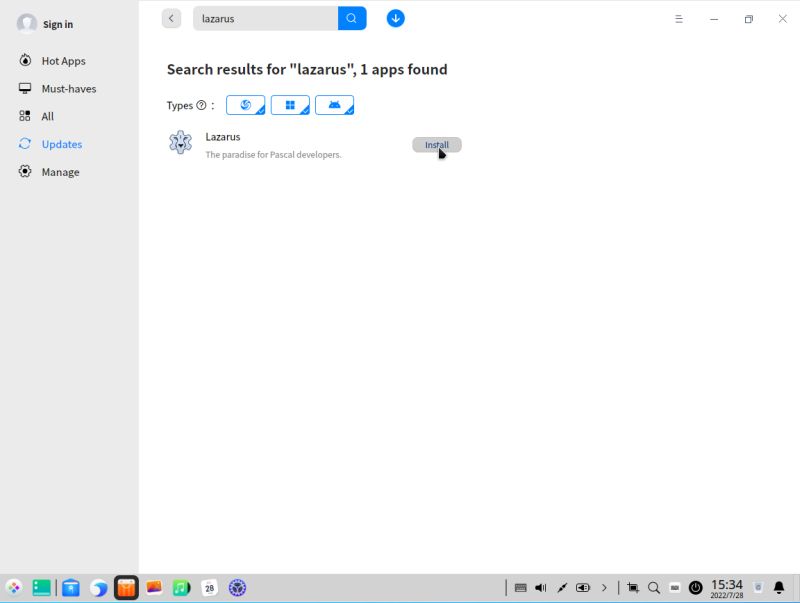 |
Lazarus/FPC on Emmabuntüs.
Emmabuntüs has a custom software installer called "Logiciels" ("Software") on my French Language Emmabuntüs DE5. Searching the development applications for Lazarus, I found Lazarus 2.2.6. The installation seems to succeed, but when trying to run the IDE (launcher in the "Development" applications group), I got the error message Can't find the lazarus executable.
I then tried to install Lazarus using Synaptic Package Manager. Searching for "lazarus", I got a list of packages, among which I selected Lazarus 2.2 for installation; all dependencies needed were automatically marked. The installation (of Lazarus 2.2.2) proceeded without problems, but when finished, I didn't find a launcher for the IDE. Not a big deal: All you need to do is to reboot the system.
When I started Lazarus, the Configure Lazarus IDE (French: "Configurer l'EDI de Lazarus") showed a problem with the Fppkg configuration. To resolve this issue, push the Restore Fppkg configuration (French: "Restaurer la configuration de Fppkg") button (screenshot on the left) and in the opening Generate new Fppkg configuration files (French: "Générer de nouveaux fichiers de configuration") window, push the Write new configuration files (French: "Écrire les nouveaux fichiers de configuration") button (screenshot on the right). When done, the red exclamation mark next Fppkg should have disappeared, all ok now and the IDE starting up properly.
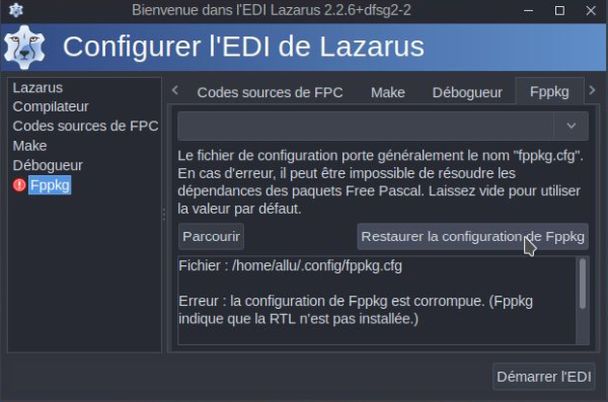
|
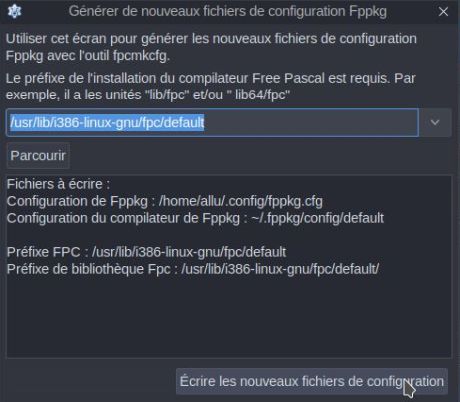
|
When building my bird quiz GUI application, the warnings that crtbeginS.o and crtendS.o are not found were displayed and also that this would probably cause a linkage failure.
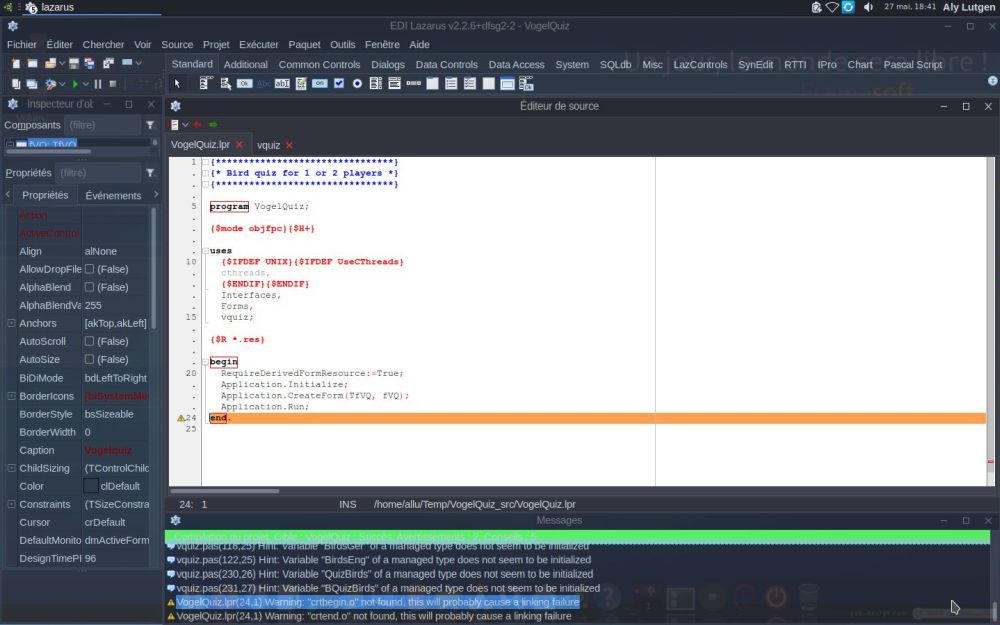 |
It didn't! The VogelQuiz project build correctly and the binary created executed all correctly from the IDE, as well as launched from the file system. I did not take the time to find a solution of the problem. Don't take me wrong, but this really begins to become annoying. Up from the beginnings of the desktop operating systems, we are told to forget about Microsoft Windows and switch to Linux. But, how can anyone expect a mainstream computer user to deal with all these things that do not work, or do not work correctly when installing new software (whereas on Windows, it nearly always works out of the box)? In fact, as for the Fppkg issue, the problem with crtbeginS.o and crtendS.o is common with Lazarus installations on Linux. Two examples (with solutions of the problem): Installing Lazarus/Free Pascal on PCLinuxOS and Installing Lazarus/Free Pascal on Solus.
Lazarus/FPC on Kubuntu.
Kubuntu has its own package manager, called Discover and there is a Lazarus package available. The installation succeeds without any problems and a Lazarus launcher is created in the "Development" group of the Start menu. However, it's not possible to actually start the IDE. An error message pops up saying Can't find the lazarus executable. And checking at /usr/lib/lazarus/2.2.4, the only executable there is "startlazarus", that actually uses (the not existing) "lazarus" to start the IDE.
So, I uninstalled Lazarus using Discover and tried to reinstall it using AptGet, following the procedure described with Ubuntu in my Installing Lazarus/Free Pascal on Linux tutorial. This worked fine, except that when launching the IDE and the Configure Lazarus IDE window shows up, I got the following error condition: There is a problem with the Fppkg configuration. To resolve this issue, push the Restore Fppkg configuration button (screenshot on the left) and in the opening Generate new Fppkg configuration files window, push the Write new configuration files button (screenshot on the right). When done, the red exclamation mark next Fppkg should have disappeared, all ok now and the IDE starting up properly.
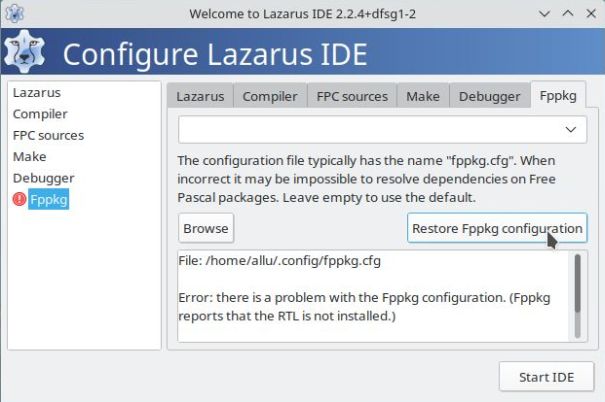
|
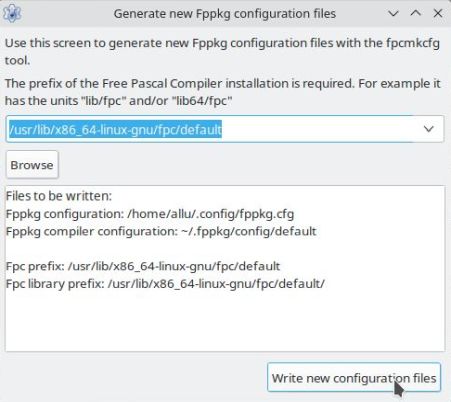
|
Lazarus/FPC on Kali Linux.
When you launch Lazarus for the first time, it's the Configure Lazarus IDE window that shows up. In the case of my Lazarus installation on Kali Linux, I got the following error condition: There is a problem with the Fppkg configuration. To resolve this issue, push the Restore Fppkg configuration button (screenshot on the left) and in the opening Generate new Fppkg configuration files, push the Write new configuration files button (screenshot on the right). When done, the red exclamation mark next Fppkg should have disappeared, all ok now and the IDE starting up properly.
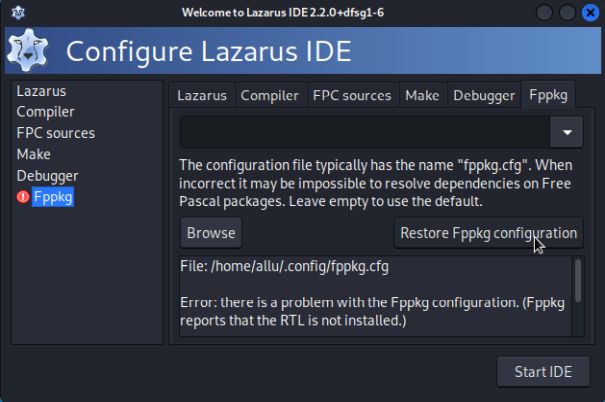
|
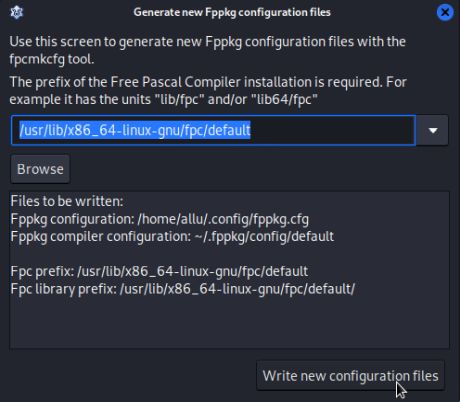
|
Note: It seems that Kali 2022.3 has issues with the installation of Lazarus, possibly similar to those, I experienced with Parrot OS.
Lazarus/FPC on Linux Lite.
Here, I used Apt to install Lazarus from the ok2cqr/lazarus repository3. Open a terminal and
enter the following commands:
sudo add-apt-repository ppa:ok2cqr/lazarus
sudo apt update
sudo apt install lazarus fpc
The 3 commands respectively add the repository, update the package list and install Lazarus/FPC.
When you launch Lazarus for the first time, it's the Configure Lazarus IDE window that shows up. In the case of my Lazarus installation on Linux Lite, I got the following error condition: There is a problem with the Fppkg configuration. To resolve this issue, push the Restore Fppkg configuration button (screenshot on the left) and in the opening Generate new Fppkg configuration files window, push the Write new configuration files button (screenshot on the right). When done, the red exclamation mark next Fppkg should have disappeared, all ok now and the IDE starting up properly.
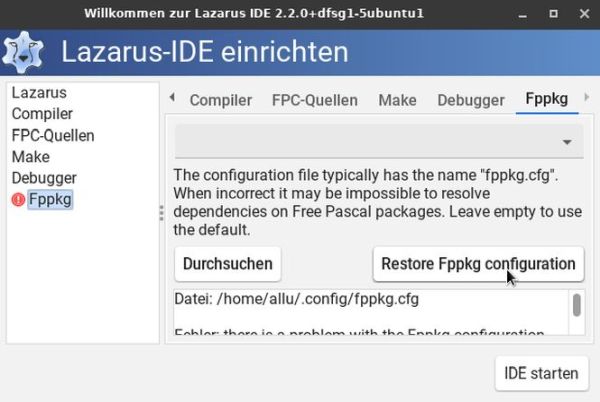
|
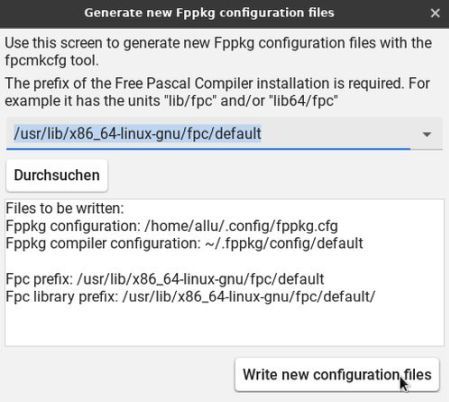
|
Lazarus/FPC on MakuluLinux.
I tried several methods to install Lazarus on MakuluLinux, without success. The reason for this might be that there isn't no longer any support for MakuluLinux LinDoz 2021, the version that I actually use.
I first tried using the MakuluLinux Software application. In Developer Tools, there are two versions of Lazarus listed: 2.2.6 and 2.0.10. I tried both and got the same error 404 (not found) in both cases.
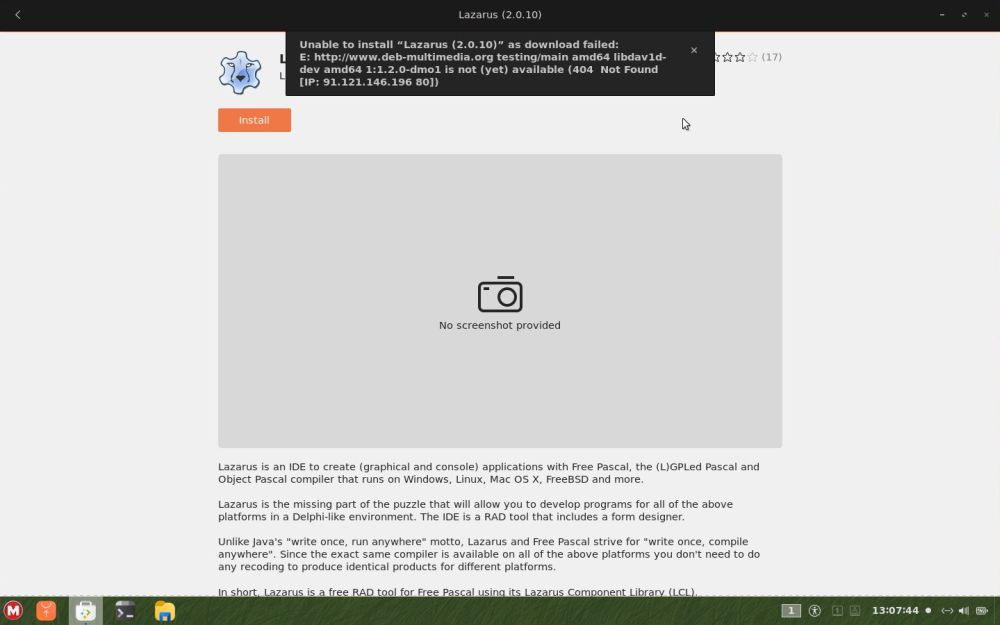 |
I then decided to try with apt-get. First, I ran sudo apt-get update to be sure to have the latest package list. As the screenshot below shows, there are are several repositories that are not working correctly. For some, there is no release file available, for others no public key; some repositories have changed the code name and the httpd server at makululinux.online refuses the connection. As I said above, maybe the problem is that I don't use the latest release.
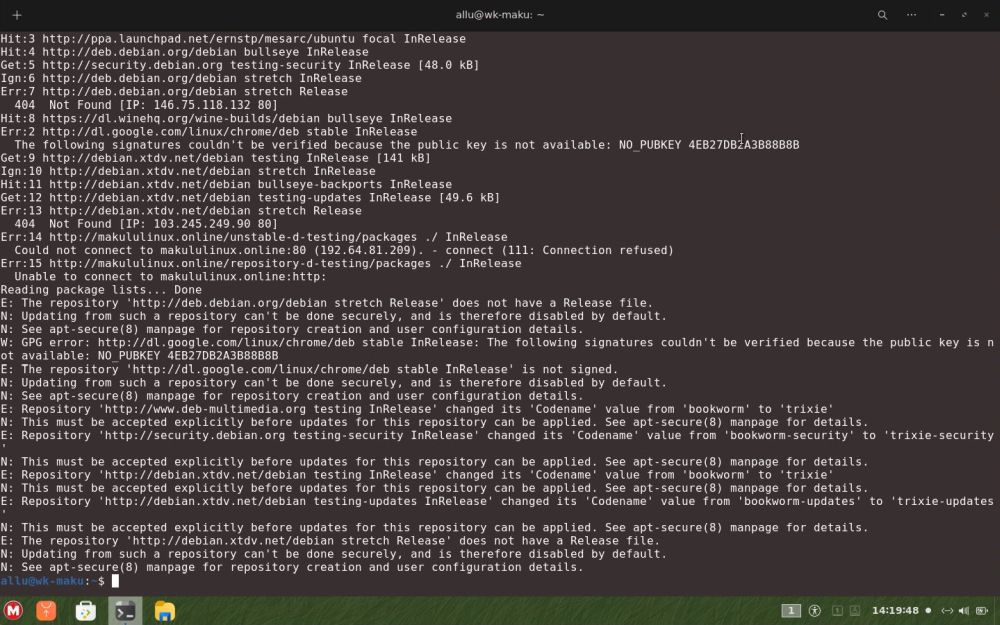 |
If you search for the "lazarus" package, you will be told that there are two of them available: lazarus-2.0 and lazarus-2.2. The same situation for both of them: Instead of starting the download, several 404 (not found) error messages, and the installation aborts. Considering the not working repositories, this is not really a surprise.
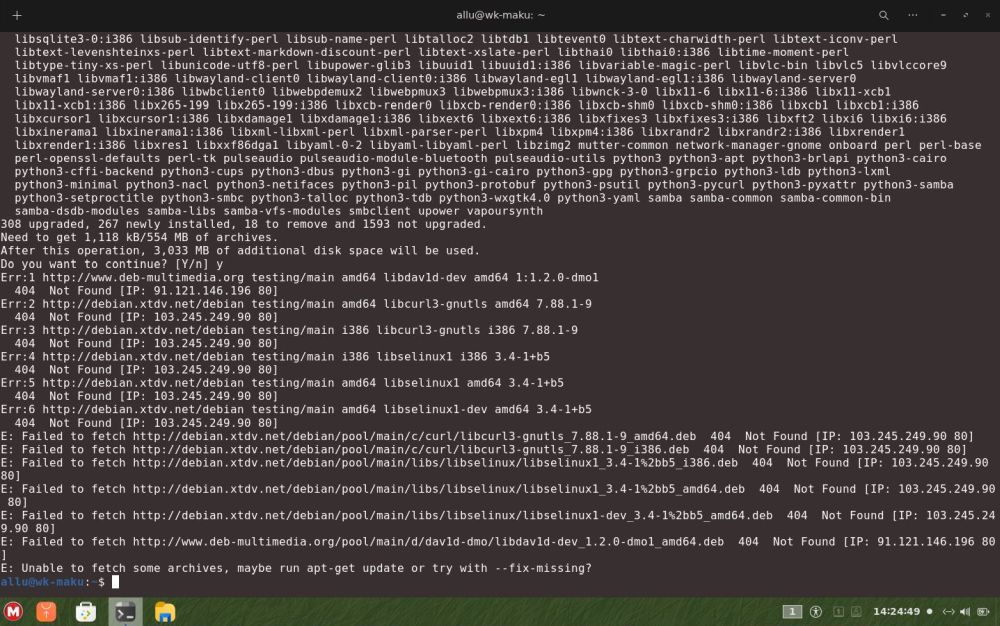 |
Trying with Synaptic Package Manager, the same as above, except that the dialog box with the error message Some of the packages could not be retrieved from the server(s) includes the possibility to continue installation without these packages. This wouldn't be a good idea, I guess, and didn't do it. Maybe that I should have tried?
Lazarus/FPC on MX Linux.
I tried to install Lazarus the "usual" way, using AptGet (for details cf. Installing Lazarus/Free Pascal on Ubuntu). When starting Lazarus for the first time, the Configure Lazarus IDE window showed up, indicating not only that there was a wrong Lazarus version stated in ide/version.inc, but also that the FPC sources and the debugger hadn't been installed!
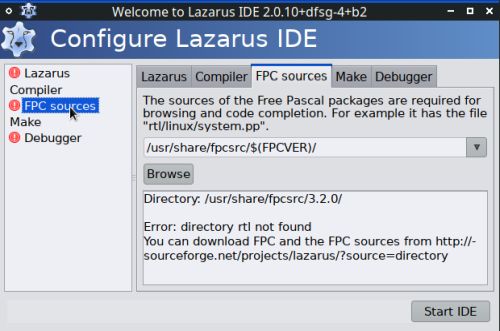
|
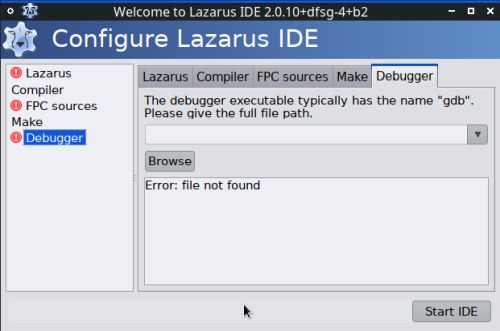
|
I decided to use the MX Package Installer to install the missing components. Maybe, that if I had used it for Lazarus, too, all dependencies would have been resolved and all Lazarus components properly installed. Maybe... The screenshot shows the results, I got, when searching for "fpc" in MX Package Installer and what packages I selected for installation. After that, I searched for "gdb", and selected the package "gdb (GNU debugger)", version 10.1-1.7 to be installed.
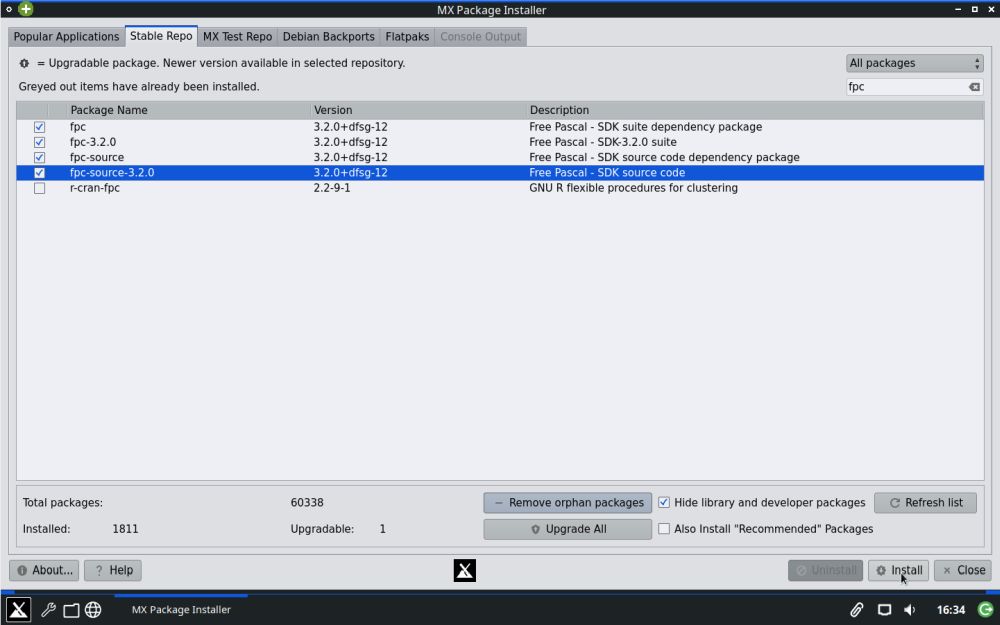 |
After all packages have been installed, I restarted Lazarus and got the message shown on the screenshot: There is already a configuration from version 2.0.10 in /home/{user-name}/.lazarus. This is due to the fact, that a configuration file had been created when I launched Lazarus after the (incomplete) installation with AptGet. You are asked if you want to change the configuration; push the Downgrade button to convert settings to the new configuration.
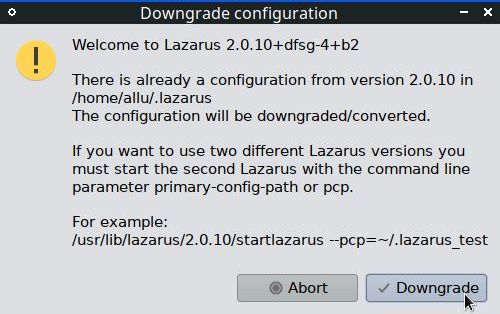 |
Nearly done. The only issue remaining is the wrong version in ide/version.inc: 2.0.10+dsfg-4, with the actual version being 2.0.10+dsfg-4+b2, as you can see in the window's title bar on the screenshot.
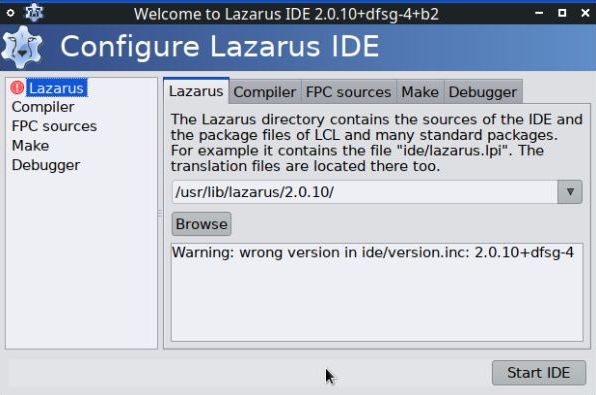 |
This issue may easily be resolved by correcting the version in the file ide/version.inc. You can use File Explorer to browse to /usr/lib/lazarus/2.0.10/ide and open the file in Pluma (Debian default text editor). Change the version stated in the file, adding the missing "+b2". As you are actually in a directory, where only the super user has the permission to write to, you will be asked for your password before you can do so. The next time, you start Lazarus, all should be ok.
Lazarus/FPC on openKylin.
I tried several ways to install Lazarus on openKylin 1.0: just failures! In the openKylin specific Software Store, there is no lazarus package available. Trying to find it using apt-cache search lazarus, the only results that I got were related to the Castle Game Engine. Finally, I tried to install Lazarus from the DEB archive, that I downloaded from Sourceforge. Double-clicking the file lazarus-project_3.0.0-0_amd64.deb, opens the Installer app, with the possibility to install the package using One-click install. Failure due to missing fpc dependencies. I searched the Ubuntu servers for Free Pascal DEB archives. Trying to install the fp-compiler-3.2.2 package, the installation failed with the error message list index out of range, whatever that should mean...
Lazarus/FPC on Parrot OS.
I tried several ways to install Lazarus 2.2.0: using the graphical Synaptic Package Manager, using AptGet, using Apt from the ok2cqr/lazarus repository: just failures, due to unmet dependencies. I posted in the Parrot forum, where I was said that there are known issues with Lazarus 2.2.0 on Parrot OS 5.0.1 (as on Kali Linux 2022.3) and that I should try Lazarus 2.0.10. I downloaded the DEB packages from Sourceforge: the FPC compiler and the sources installed without problems, but no chance for the Lazarus package: Could not download all required files error message. I actually gave it up at this stage. If I get some new answers in the forum, I'll update this document; if someone, reading this text, has any suggestions, please, let me know.
Lazarus/FPC on Peppermint OS (Devuan).
Even though I think that the situation is the same with other releases, please, note that I actually use Peppermint OS 11 32bit based on Devuan. I chose to install Lazarus using the Synaptic Package Manager. Searching for "lazarus", two packages are shown as available: "lazarus-2.2" and "lazarus-2.0". Installing version 2.2, does not work: The error message Could not mark all packages for installation or upgrade pops up as soon as you select the package. So, it's Lazarus 2.0 that has to be used. In the Synaptic Packager Manager search results for "lazarus", I checked the packages "lazarus-2.0" (that affects several packages with names starting with "fp-"), "fpc-source" (that also selects "fpc-source-3.2.0"), as well as "lazarus-doc-2.0".
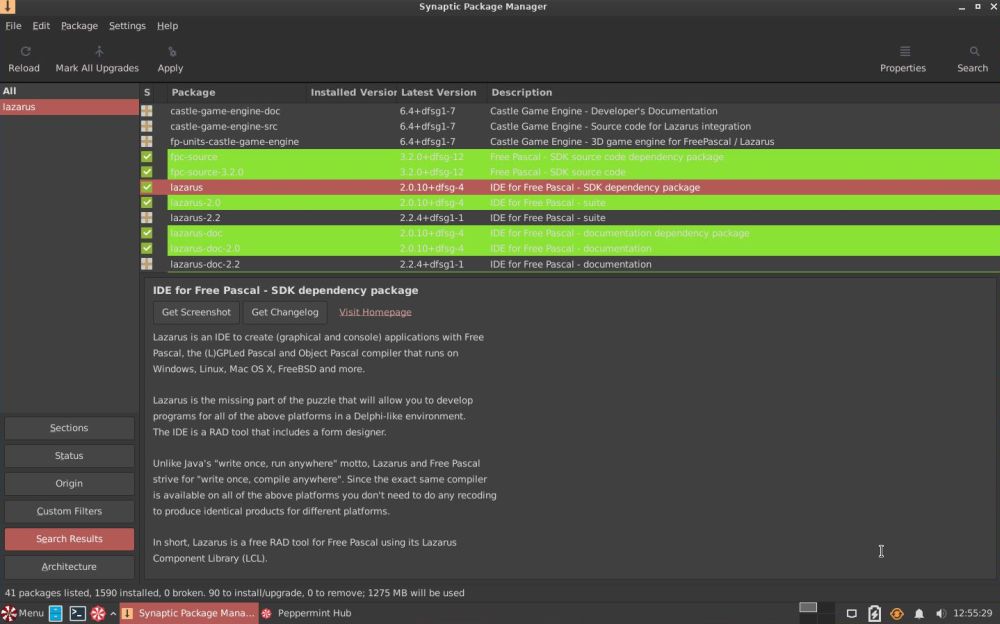 |
Then, I searched for "fpc", and from the search results, I selected the package "fpc" (that also selects "fpc-3.2.0" and others), as well as the other "-3.2.0" packages not yet selected (cf. screenshot for details).
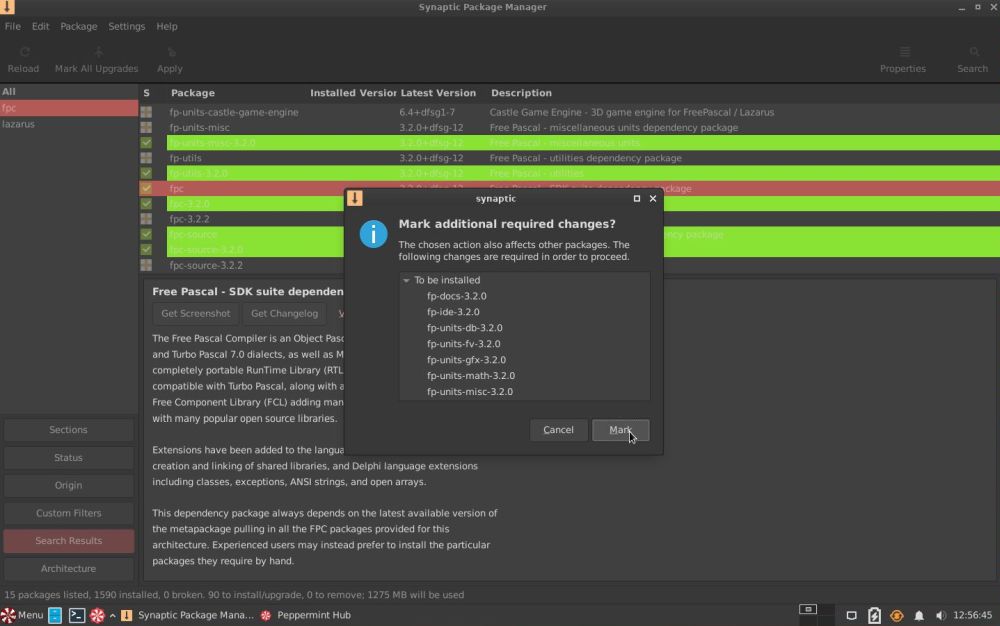 |
The installation should be without any problems, and when finished, the Lazarus launcher should be present in the "Development" section of the Start menu. A surprise, however: Instead of the expected version 2.0.10, the launcher is labeled Lazarus 2.2.4.
Obvious, that when launching Lazarus for the first time and the Configure Lazarus IDE window shows up, there is an error reported for the IDE itself: wrong version in ide/version.inc; 2.0.10+dsfg-4, with the actual version being 2.2.4+dsfg1-1, as you can see in the window's title bar on the screenshot. But there are two other issues: 1. the GNU Debugger has not been found, and 2.there is a problem with Fppkg.
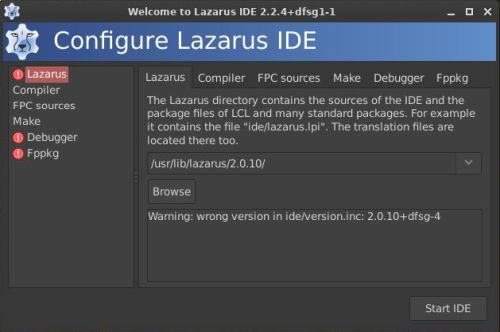 |
The GNU Debugger has not been found because it is not installed by default on Peppermint OS. Resolve the issue by installing the package "gdb" (plus all the automatically selected dependencies). I did it the same way as for Lazarus and fpc: using the Synaptic Package Manager.
When installation is done and you relaunch Lazarus, a window pops up telling you that there is already a configuration from version 2.0.10 in /home/{user-name}/.lazarus. Push the Upgrade button to overwrite the old (erroneous) configuration file (converting the existing settings to the new configuration).
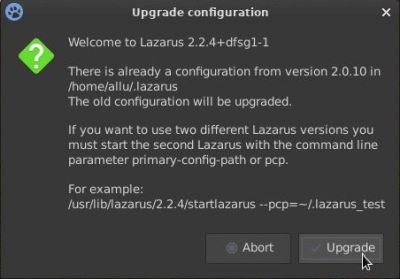 |
Two issues remaining: the version of the IDE and Fppkg. To solve the first one, you'll have to edit the file version.inc, located in the /usr/lib/lazarus/2.0.10/ide directory. Replace the version written there by the one shown in the title bar of the Configure Lazarus IDE window, that is 2.2.4+dsfg1-1.
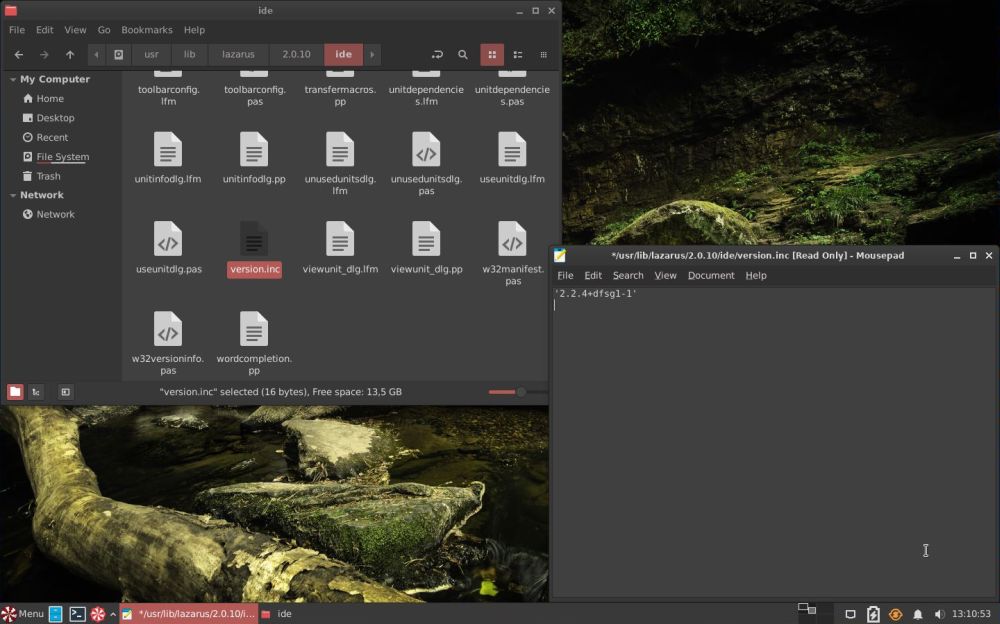 |
Use the Save As command of the text editor to save version.inc to some location in your home directory. Then open a terminal and, as
super-user, copy the file to its original location. Being in the directory where you saved the file, run the command
sudo cp version.inc /usr/lib/lazarus/2.0.10/ide/version.inc
I'm not sure about this, but I suppose that there is something wrong here, that there is some version mismatch. Lazarus has been installed into a directory called "2.0.10" and the compiler is version 3.2.0 (that is the compiler included with Lazarus 2.0.x, the one being included with Lazarus 2.2.x being version 3.2.2). This means that the version of Lazarus actually installed is (seems to be) version 2.0.10. And the IDE itself being version 2.2.4! Maybe this is the reason for the issues described below?
Remains the Fppkg problem. In the Configure Lazarus IDE window, select Fppkg and push the Restore Fppkg configuration button. Then, in the opening Generate new Fppkg configuration files window, push the Write new configuration files button. Be sure to let the path auto-filled in (in my case: /usr/lib/i386-linux-gnu/fpc/default) unchanged!
Now all red exclamation marks in Configure Lazarus IDE should be gone and we can start the IDE. Not everything is fine on my system: Several warning messages pop up, telling that a given package file hasn't be found (push the Ignore these warnings button), or that there is a package registration error (push the Ignore all button).
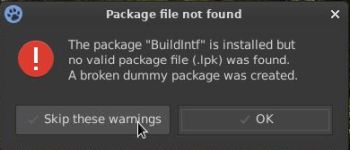
|
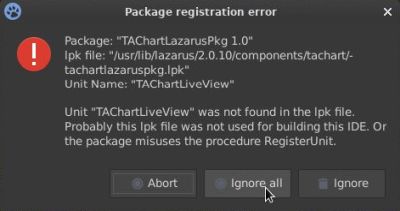
|
These warnings are displayed each time that you start the IDE. Are they related to the version mismatch, I talked about further up in the text? Is it possible to resolve the issue? Or, at least, make disappear the messages? As my Lazarus/FPC installation works well, I did not try to find a solution...
Another warning message only pops up the first time the IDE is launched. Does it mean that the documentation installation is incomplete? As for the other warnings, I did not try to find out what it's really about and how to resolve the issue...
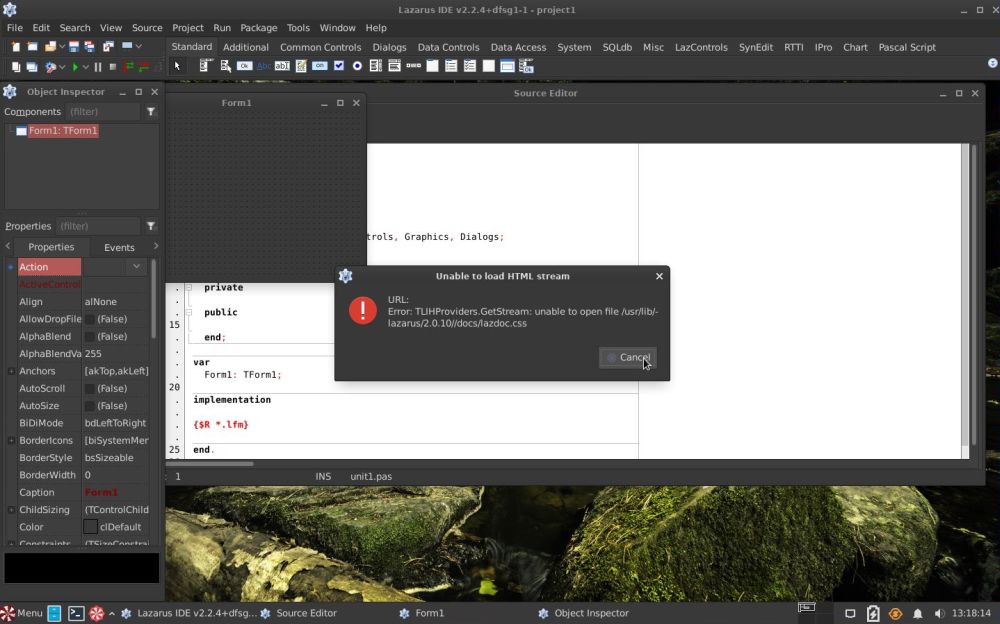 |
Difficult to understand for me, why developers design these "reversed-colors" interfaces and how users do to read a white text on a green background... Anyway, despite the installation issues, the warning pop-ups and the (probable) version mismatch, my Lazarus installation seems to work correctly (some packages not being available). I successfully built and ran my BlackJack2 GUI application. That's what finally counts, isn't it?
Lazarus/FPC on Pop!_OS.
I first tried to install Lazarus using Pop!_Shop. The package (version 2.2.0) is actually available and installation succeeded, but when I tried to launch the IDE, I got the error message Can't find the lazarus executable. I didn't investigate this further, but decided to do as I did on Ubuntu and to use apt-get.
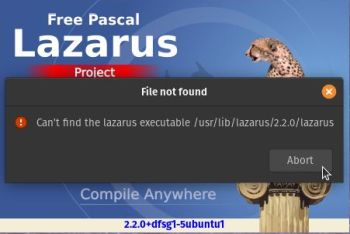 |
When you launch Lazarus for the first time, it's the Configure Lazarus IDE window that shows up. In the case of my Lazarus installation on Pop!_OS (as on several other distributions), I got the error message: There is a problem with the Fppkg configuration. To resolve this issue, push the Restore Fppkg configuration button (screenshot on the left) and in the opening Generate new Fppkg configuration files, push the Write new configuration files button, without changing the path indicated by default (screenshot on the right). When done, the red exclamation mark next Fppkg should have disappeared, and the IDE should start up properly.
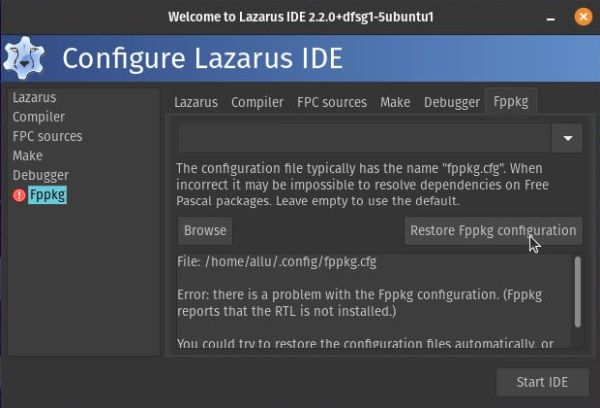
|
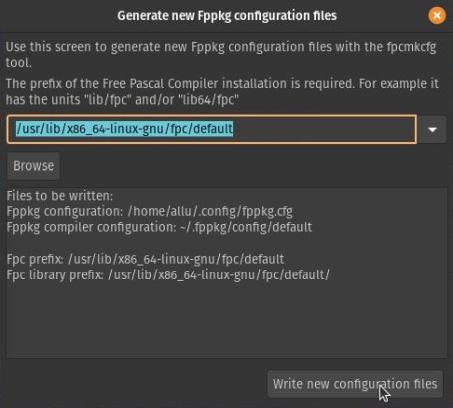
|
However, there is a (not really important) issue remaining: Lazarus has no picture icon on its launcher in Applications. It's just the picture that is missing. As you can see on the screenshot below, the launcher is there, and if you click it, the Lazarus IDE starts up.
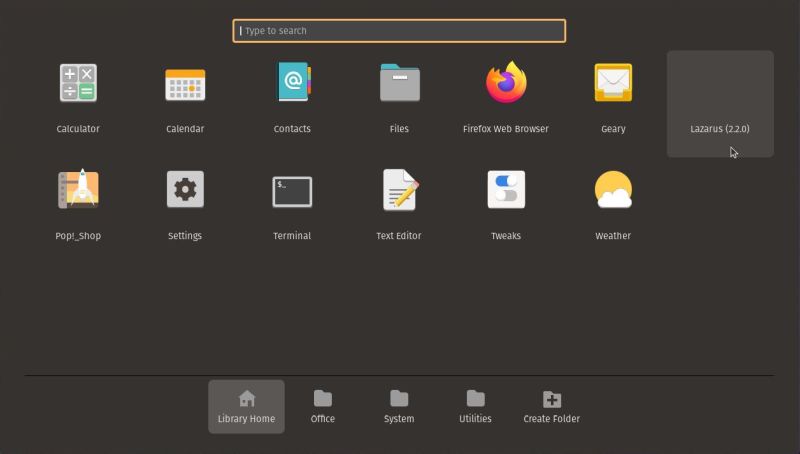 |
This is a problem that I had never before, and being far away from being a Linux specialist, it took some time, before I figured out how to solve the issue. On Ubuntu based systems (probably on others, too), the applications are described by .desktop files stored in /usr/share/applications. These files contain information such as the app name, the executable name, if it has to be run in a terminal or not. They also contain the name of the app icon. The icons referenced in these files may be stored at several locations, the (probably?) most used icon directory being /usr/share/app-install/icons.
In my file lazarus-2.2.0.desktop, I found the line
Icon=lazarus-2.2.0
No icon file with this name in the directory mentioned above (there is a lazarus.png file there, but this one has nothing to do with the app icon), so my first
idea was to copy lazarus.ico from /usr/lib/lazarus/2.2.0/ide to /usr/share/app-install/icons, renaming it to lazarus-2.2.0.ico (the name used in the .desktop
file). This had no effect, and trying the same using a lazarus.png file (that I downloaded from the Internet) didn't change anything, either.
Finally, I decided to modify the file lazarus-2.2.0.desktop in the /usr/share/applications directory, specifying the full path to the original icon
in the Lazarus installation directory:
Icon=/usr/lib/lazarus/2.2.0/ide/lazarus.ico
After rebooting the system, Lazarus finally had its icon in Applications!
Note: You can open and modify lazarus-2.2.0.desktop in a text editor, but as simple user, you cannot save the modified file to its
original location. Use the Save As command of the editor to save it somewhere into your home directory (I chose the Temp folder that I'd had
created there) and then, as root in a terminal, copy the file to /usr/share/applications. To do so (being in /home/Temp), run the command
sudo cp lazarus-2.2.0.desktop /usr/share/applications
Lazarus/FPC on SemiCode OS.
Using Ubuntu Software Center did not work for me: FPC sources and debugger were not installed. So, trying the "usual" way, using AptGet (for details cf. Installing Lazarus/Free Pascal on Ubuntu). This installed the (very) old version 1.0.10, that, of course will not be able to build all projects, developed with the recent Lazarus version, but, in many cases, will work, or will work after a few changes in the source code. One little problem with the broken package "leakview". Just push the OK button, when the message pops up. Except probably for projects using this package, all should work correctly.
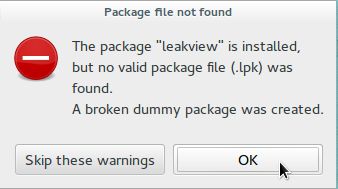 |
Lazarus/FPC on SysLinuxOS.
I installed Lazarus on my SysLinuxOS using apt-get. Open a terminal and run the command:
sudo apt-get install lazarus
A Lazarus launcher will appear in the Programming group of the Applications menu. When launching the IDE and the Configure Lazarus IDE window showed up, I got the following error condition: There is a problem with the Fppkg configuration. This is very common with Lazarus on Linux. To resolve the issue, push the Restore Fppkg configuration button, and in the opening Generate new Fppkg configuration files window, push the Write new configuration files button. When done, the red exclamation mark next Fppkg should have disappeared, all ok now and the IDE starting up properly (for screenshots of the issue, cf. Kubuntu, or Linux Lite, for example).
Building and running my BlackJack2 application worked all fine.
Taking a Lazarus project developed (and running correctly) on Windows, just building it on Linux and having the same correctly running application as on Windows is theory. In practice, there seem to be huge differences concerning the GUI components, and the GUI on Linux appears differently, acts differently, or is totally unusable as in the case of my Blumenquiz application (screenshot). As I did not try this application with other Linux distributions, I can't say if it is a problem on SysLinuxOS, or a global problem on (some or all) Linux operating systems.
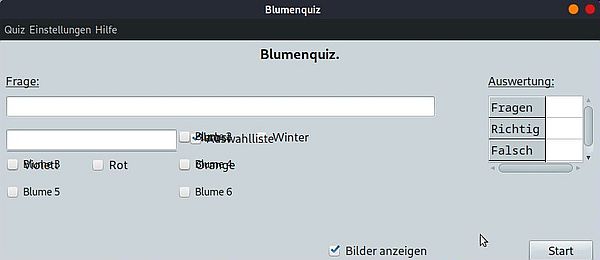 |
Lazarus/FPC on Uruk GNU/Linux.
The Synaptic Package Manager can be started from the Uruk Welcome window ("Apps"). The first action, that you should take is to reload the package list. Then, you can use the Search feature to search for a given package (similarly to using apt-cache search in the terminal).
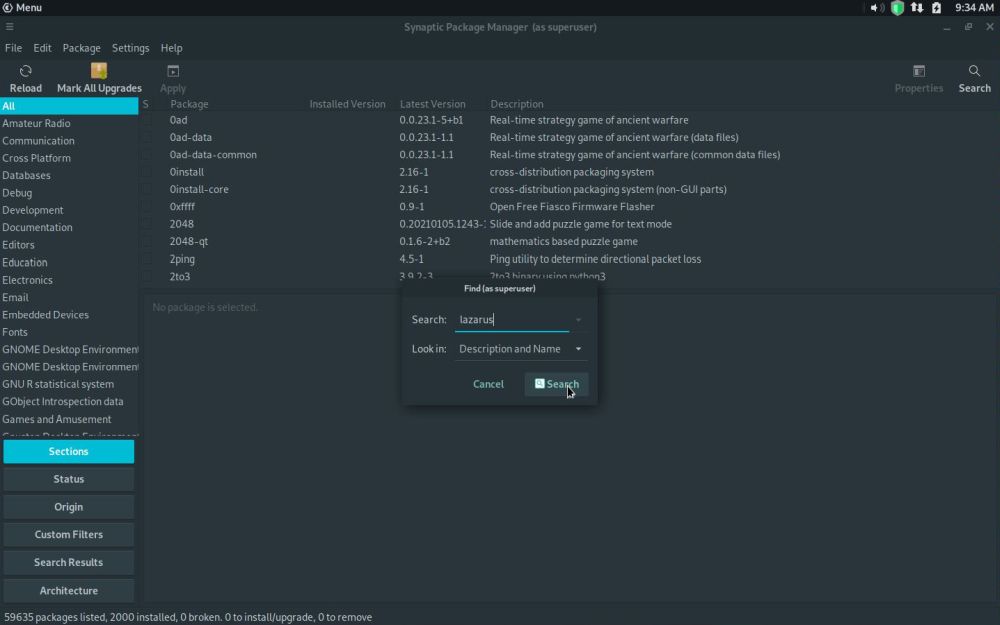 |
In the package list displayed, click lazarus and choose Mark for Installation.
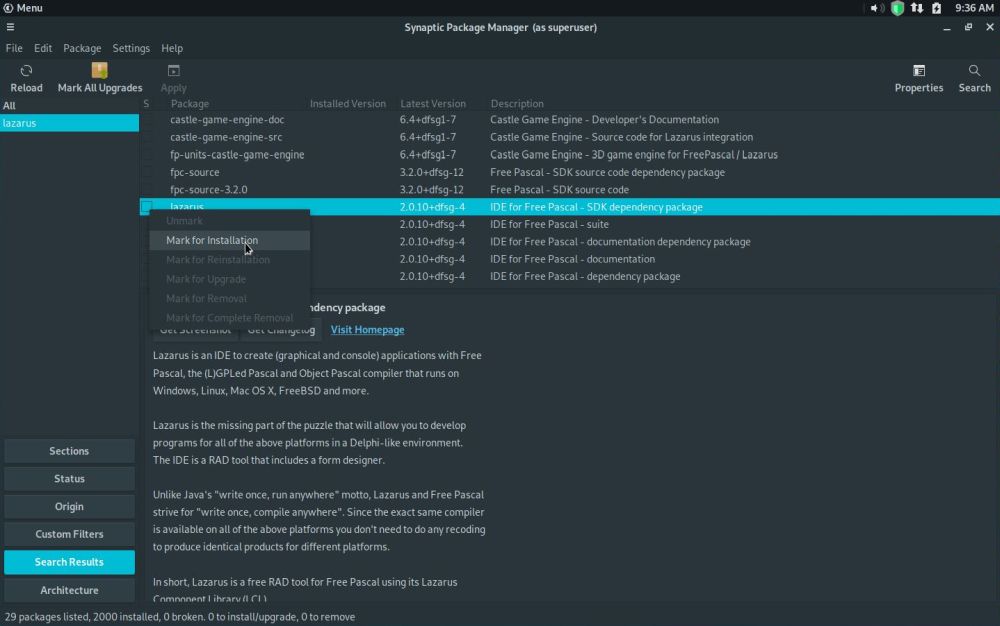 |
Synaptic Package Manager tells you that additional packages are required and asks you if you want to mark them for installation, too. Push the Mark button to do so.
Also mark the packages fpc-source (mandatory) and lazarus-doc (if you want so). When all packages are marked, push the Apply button in the menu bar.
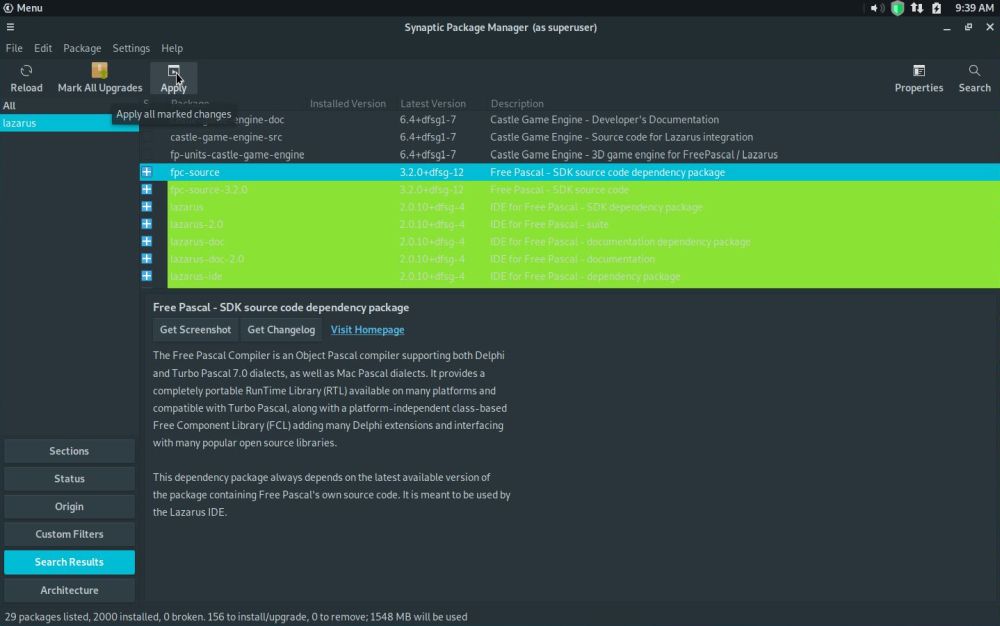 |
A summary of the installation is displayed and you have to confirm (Apply button) to start install.
The new files are downloaded and unpacked. This was rather fast on my machine. When done, the message Successfully applied all changes is displayed and you can close the window. As there wasn't a launcher in the Uruk Menu, I rebooted the computer here. Now, the launcher Lazarus (with a question mark instead of the typical Lazarus icon?) appears in the Programming group.
When you launch Lazarus for the first time, as on all other platforms, it's the Configure Lazarus IDE window that shows up. In the case of my Lazarus installation on Uruk, a problem was reported concerning the IDE itself: Wrong version in ide/version.inc: 2.0.10+dsfg-4, with the actual version being 2.0.10+dsfg-4+b2, as you can see in the window's title bar on the screenshot.
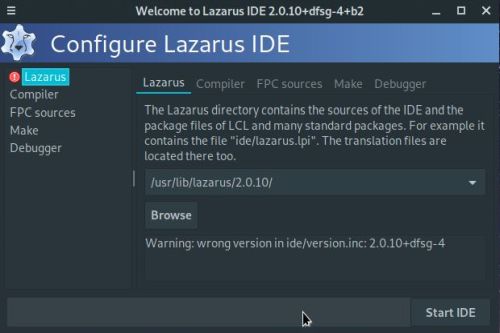 |
This issue may easily be resolved by correcting the version in the file ide/version.inc. You can use File Explorer to browse to /usr/lib/lazarus/2.0.10/ide, right-click the file and choose Edit as administrator from the context menu to open it in Pluma (Uruk default text editor). Change the version stated in the file, adding the missing "+b2" and, as you actually are root, you may directly save it to its original location.
Lazarus/FPC on wattOS.
To install Lazarus on my wattOS VMware virtual machine, I used the graphical application Synaptic Package Manager. Refresh the package list, then search for "lazarus". All related packages will be displayed. From this list, select "lazarus" (without version number). A window showing the additional changes to make pops up. Click the Mark button to include them in the download and installation.
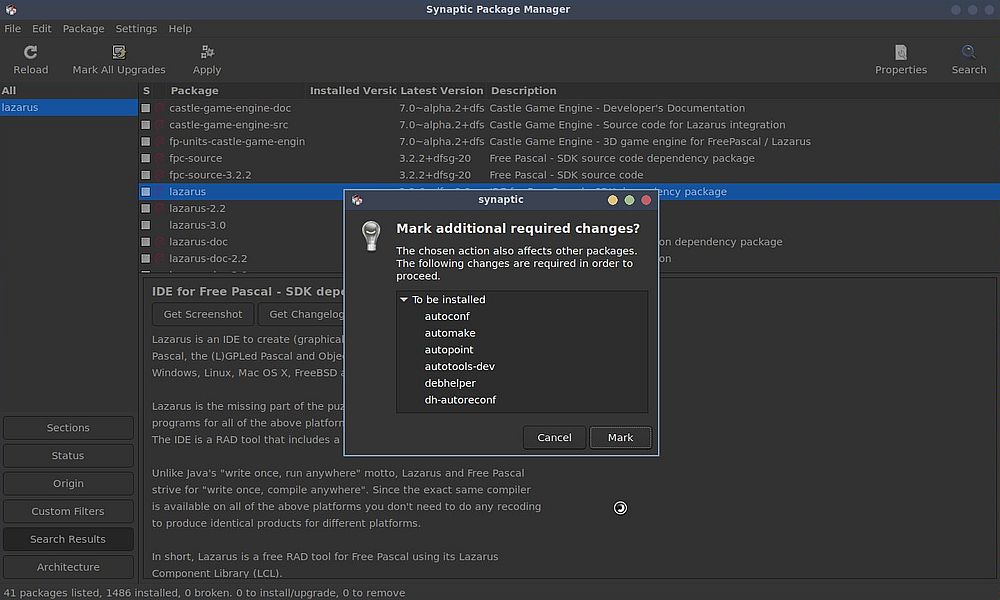 |
When launching the IDE and the Configure Lazarus IDE window showed up, I got the following error condition: There is a problem with the Fppkg configuration. This is very common with Lazarus on Linux. To resolve the issue, push the Restore Fppkg configuration button, and in the opening Generate new Fppkg configuration files window, push the Write new configuration files button. When done, the red exclamation mark next Fppkg should have disappeared, all ok now and the IDE starting up properly (for screenshots of the issue, cf. Kali Linux, or Pop!_OS, for example).
The build and the execution of my Kendoku application succeeded, however, the application GUI is totally unusable. That the Static text components are not the same on Windows and Linux, I noticed with other Linux distributions already, but the real issue here is the "dark skin model" (black forms) of Lazarus on wattOS. In fact, with default font settings, the text in edit fields and memos will be invisible (as show the two "empty" memos on the screenshot below).
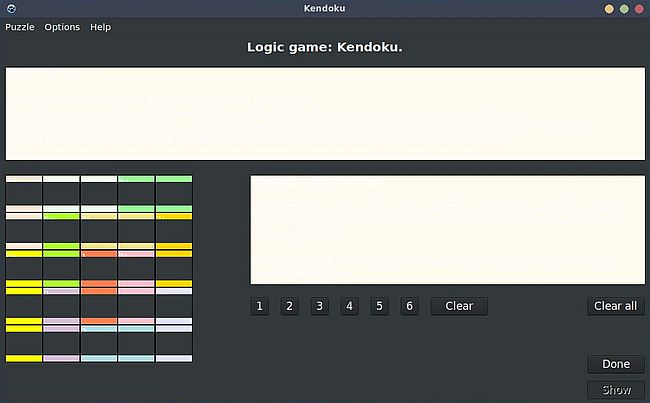 |
Lazarus/FPC on Zorin OS.
I used Apt to install Lazarus from the ok2cqr/lazarus repository3. Open a terminal and enter the following
commands:
sudo add-apt-repository ppa:ok2cqr/lazarus
sudo apt update
sudo apt install lazarus fpc
The 3 commands respectively add the repository, update the package list and install Lazarus/FPC.
Notes:
1: If, after the installation is done, you don't find a launch shortcut for Lazarus, rebooting may be required. Also, you can
normally launch the IDE from a terminal by entering lazarus-ide.
2: I haven't installed Lazarus on Linux Mint, to be sure not to mess up my FPC cross-compiler for DOS, 16bit, installed there.
3: If with some Linux distribution, you get the error message that add-apt-repository does not exist, install the package software-properties-common before using it.
If you find this text helpful, please, support me and this website by signing my guestbook.